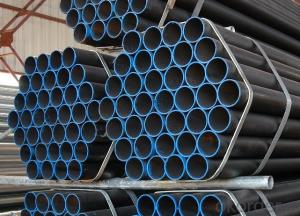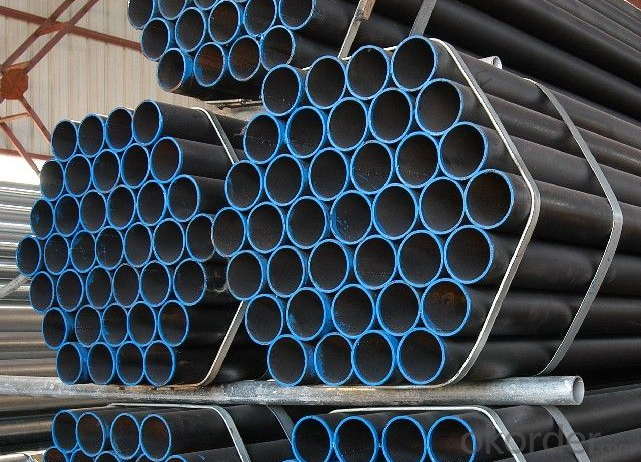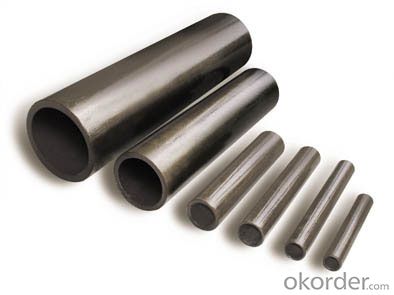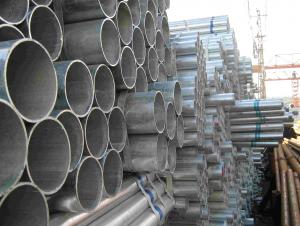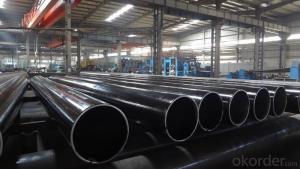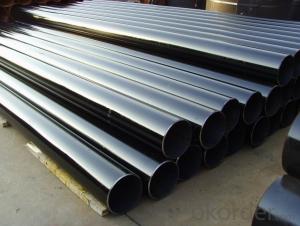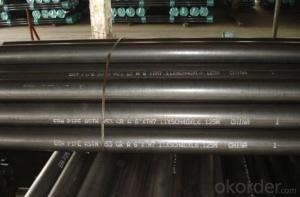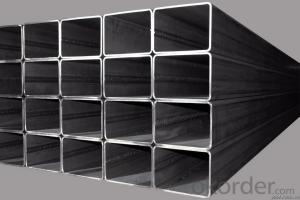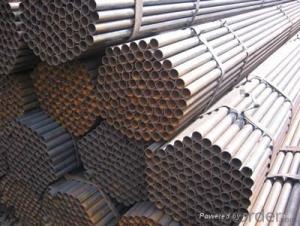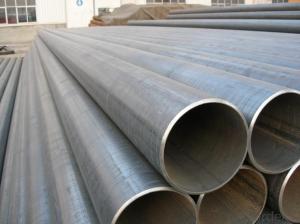ASME API 5L High Quality ERW Pipe Welding
- Loading Port:
- Tianjin
- Payment Terms:
- TT or LC
- Min Order Qty:
- 25 m.t.
- Supply Capability:
- 10000 m.t./month
OKorder Service Pledge
OKorder Financial Service
You Might Also Like
We are company that have many years experience and professional manager team and engineer team and sales team, sure we will provide you high quality of pipe and professioanl service.
Seamless pipe possesses a hollow section and without seam around the strip steel. It is made with solid bar or steel ingot by perforating machine. As the facture process does not include any welding, seamless pipes are considered to be stronger and more durable. Generally speaking, seamless pipe has better pressure resistance and security than other classifications, and was usually more easily available than welded pipe.
2、Main Features of the Seamless Pipe:
• High working accuracy
• High strength
• Small inertia resistance
• Strong therming dissipine ability
• Good appearance
• Reasonble price
3、Seamless Pipe Specification:
Standard | GB, DIN, ASTM ASTM A106-2006, ASTM A53-2007 |
Grade | 10#-45#, 16Mn 10#, 20#, 45#, 16Mn |
Thickness | 8 - 33 mm |
Section Shape | Round |
Outer Diameter | 133 - 219 mm |
Place of Origin | Shandong, China (Mainland) |
Secondary Or Not | Non-secondary |
Application | Hydraulic Pipe |
Technique | Cold Drawn |
Certification | API |
Surface Treatment | factory state or painted black |
Special Pipe | API Pipe |
Alloy Or Not | Non-alloy |
Length | 5-12M |
Outer Diameter | 21.3-610mm |
Grade | 20#, 45#, Q345, API J55, API K55, API L80, API N80, API P110, A53B |
Standard | ASME, ASTM |
1) Material:20#(ASTM A 106/A53 GRB.API5LGRB,GB),45#,16Mn,10#.
2) Specification range: OD: 21.3-610mm, WT:6-70mm, length:6-12m or according to the requirement of clients.
3) Executive standards: GB, ASME API5L.ASTM A 106/A53,Despite of the above standards, we can also supply seamless steel pipe with standard of DIN, JIS, and so on, and also develop new products according to the requirements of our clients!
4) Surface: black lacquered, varnish coating or galvanized.
5) Ends: Beveled or square cut, plastic capped, painted.
6) Packing: bundles wrapped with strong steel strip, seaworthy packing.
4、Packaging & Delivery:
Packaging Details: | seaworthy package, bundles wrapped with strong steel strip |
Delivery Detail: | 15-30days after received 30%TT |
5、FAQ of Seamless Pipe:
①How is the quality of your products?
We have many years business experience in this area, and we have professional engineer and manager team and sure we can provide you high quality production and professional service.
②How about price?
Yes, we are factory and be able to give you lowest price below market one, and we have a policy that “ for saving time and absolutely honest business attitude, we quote as lowest as possible for any customer, and discount can be given according to quantity”,if you like bargain and factory price is not low enough as you think, just don’t waste your time.Please trust the quotation we would give you, it is professional one.
③Why should you chose us?
We can give you both.Additionally, we can also offer professional products inquiry, products knowledge train(for agents), smooth goods delivery, exellent customer solution proposals.Our service formula: good quality+good price+good service=customer’s trust
SGS test is available, customer inspection before shipping is welcome, third party inspection is no problem.
6、Seamless Pipe Images:
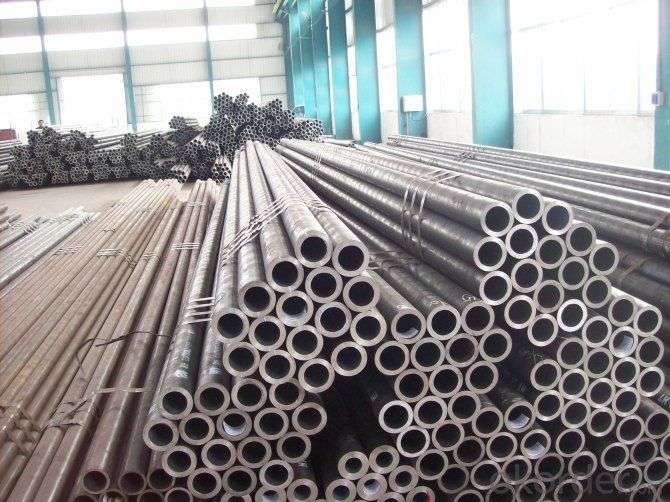
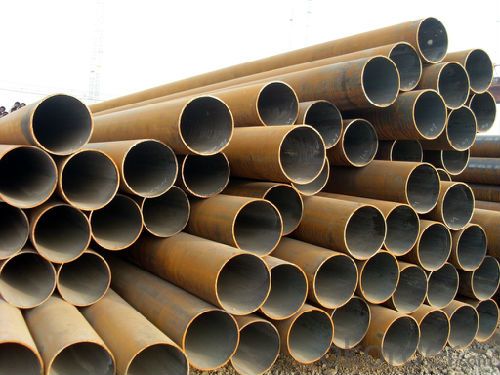
- Q: How do steel pipes compare to other materials in terms of cost?
- Steel pipes are generally more cost-effective compared to other materials due to their durability and longevity. While the initial investment may be higher, their lower maintenance and replacement costs make them a more economical choice in the long run. Additionally, steel pipes can withstand harsh environmental conditions and are less prone to corrosion, reducing the need for frequent repairs or replacements.
- Q: What is the difference between steel pipe and fiberglass pipe?
- Steel pipe and fiberglass pipe differ in terms of material composition, durability, flexibility, and cost. Steel pipe is made of steel, which provides strength and resilience, making it ideal for high-pressure applications and underground installations. Fiberglass pipe, on the other hand, is composed of reinforced plastic fibers, resulting in a lightweight and corrosion-resistant material suitable for above-ground and corrosive environments. While steel pipe offers higher tensile strength, fiberglass pipe excels in its flexibility, allowing for easier installation and reduced maintenance. Additionally, steel pipe is typically more expensive due to the cost of materials and manufacturing processes, while fiberglass pipe is more cost-effective in terms of initial installation and long-term maintenance.
- Q: How are steel pipes used in the construction of gas distribution networks?
- Steel pipes are commonly used in the construction of gas distribution networks due to their durability, strength, and ability to withstand high pressure. These pipes are used to transport natural gas from the source to homes, businesses, and industries. The steel pipes are laid underground and connected using fittings and valves to create a network that efficiently distributes gas. It ensures a safe and reliable delivery of gas to consumers while minimizing the risk of leaks or accidents.
- Q: Are steel pipes suitable for underground chemical transport?
- No, steel pipes are not suitable for underground chemical transport as they can corrode and react with certain chemicals, posing safety risks and potentially contaminating the transported substances.
- Q: What are the different types of steel pipe coatings for marine applications?
- There are several types of steel pipe coatings used for marine applications, including fusion-bonded epoxy (FBE) coatings, three-layer polyethylene (3LPE) coatings, three-layer polypropylene (3LPP) coatings, and concrete weight coatings (CWC). These coatings provide protection against corrosion, abrasion, and other environmental factors, ensuring the longevity and durability of the steel pipes in marine environments.
- Q: What is the difference between hot-dip galvanizing and electroplating for steel pipes?
- Hot-dip galvanizing and electroplating are both methods used to protect steel pipes from corrosion, but they differ in the process and the properties of the resulting coating. Hot-dip galvanizing involves immersing the steel pipe in a bath of molten zinc, which forms a thick and durable coating that bonds metallurgically with the steel. This provides excellent corrosion resistance and protection even in harsh environments. On the other hand, electroplating involves the deposition of a thin layer of zinc onto the steel pipe using an electric current. While electroplating also offers corrosion protection, the coating is typically thinner and less durable than hot-dip galvanizing. Hot-dip galvanizing is typically preferred for steel pipes that require long-lasting protection, while electroplating may be suitable for applications where a thinner coating is sufficient.
- Q: Can steel pipes be used for hydropower generation?
- Indeed, the utilization of steel pipes is possible for the generation of hydropower. Within hydropower systems, steel pipes find widespread application in various contexts like penstocks and pipelines. Penstocks, characterized by their large size, are responsible for transporting water from a reservoir to a turbine, facilitating the conversion of the water's kinetic energy into rotational energy. Consequently, these pipes necessitate robustness and longevity to endure the immense water pressure and structural weight. Furthermore, steel pipes are also employed for pipelines, facilitating the transportation of water from the turbine back to the river or reservoir. Ultimately, steel pipes are an indispensable element in the generation of hydropower, as they possess the necessary strength, durability, and resilience to withstand the challenging conditions associated with water flow.
- Q: How are steel pipes used in the construction of hydroelectric power plants?
- Steel pipes are used in the construction of hydroelectric power plants for various purposes, such as transporting water, containing and directing the flow of water, and supporting the weight of turbines and other equipment. They are typically used for penstocks, which are large pipes that carry water from the dam to the turbines, and for discharge pipes that release water back into the river. The strength and durability of steel pipes make them ideal for withstanding the high pressure and heavy loads involved in hydroelectric power generation.
- Q: Are steel pipes suitable for underground cable protection?
- Indeed, underground cable protection can be achieved through the use of steel pipes. These pipes boast remarkable durability and strength, rendering them an optimal choice for safeguarding cables against external elements such as physical harm, wetness, and corrosion. They are capable of enduring the soil's weight and any potential pressure from above, guaranteeing the cables' security and protection. Furthermore, steel pipes can be effortlessly welded or connected to establish a continuous and flawless conduit, thereby bolstering their efficacy in underground cable protection.
- Q: What are the different standards for steel pipe manufacturing?
- There are several standards for steel pipe manufacturing, including ASTM (American Society for Testing and Materials), API (American Petroleum Institute), DIN (Deutsches Institut für Normung), and JIS (Japanese Industrial Standards). These standards define the specifications for various aspects of steel pipe production, such as dimensions, material composition, mechanical properties, and testing procedures. Compliance with these standards ensures the quality and reliability of steel pipes for different applications, ranging from construction and infrastructure to oil and gas industries.
Send your message to us
ASME API 5L High Quality ERW Pipe Welding
- Loading Port:
- Tianjin
- Payment Terms:
- TT or LC
- Min Order Qty:
- 25 m.t.
- Supply Capability:
- 10000 m.t./month
OKorder Service Pledge
OKorder Financial Service
Similar products
Hot products
Hot Searches
Related keywords
